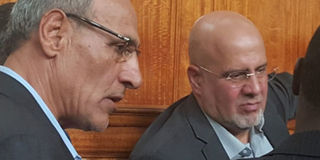Supreme Court sends Iranian terror suspects back to jail

Iranian nationals Ahmad Abolfathi Mohammed and Sayed Mansour Mousavi consult with their lawyer Cohen Amanya after the Supreme Court on March 15, 2019 reinstated their 15-year jail imposed on each by High Court over terror plot. PHOTO | RICHARD MUNGUTI | NATION MEDIA GROUP
What you need to know:
Mr Ahmednasir argued that an accused person in under no obligation to say anything when arrested.
The Director of Public Prosecutions said the two Iranians were convicted based on circumstantial evidence.
The DPP said it was upon the two to explain how the explosives ended up at the spot.
The two Iranians, who were arrested in 2012 with bomb making materials will go back to jail.
This is after the Supreme Court on Friday overturned a Court of Appeal ruling which had freed them.
Ahmad Abolfathi Mohammed and Sayed Mansour Mousavi, who were sentenced to 15 years in jail, will serve the remainder of their term.
Upon completion of their jail term, they will be repatriated to Iran.
The suspects had been freed by the Court of Appeal on second appeal, but were later arrested after the government moved to the Supreme Court.
The two, through Senior Counsel Ahmednassir Abdullahi, urged the court to dismiss the appeal arguing that the application was frivolous.
In his submissions, Mr Ahmednasir said the appeal was frivolous and based on shaky ground. He said the prosecution had tried to shift the burden to the Iranians after claiming that they led the police to the spot where the explosives were discovered.
“The burden of proof does not shift at any point in criminal cases whether the accused persons talk or not. The prosecution must discharge the burden,” he said.
He said it was not the business of the accused persons to help the police conduct investigations.
EXPLOSIVES
Mr Ahmednasir argued that an accused person in under no obligation to say anything when arrested.
The Director of Public Prosecutions, through Waweru Gatonye, said the two Iranians were convicted based on circumstantial evidence.
He said the two led the police to the spot where the RDX explosives were discovered.
The DPP said it was upon the two to explain how the explosives ended up at the spot.
He said witnesses, including two taxi drivers, who picked the suspects from Moi International Airport before taking them to Castle Royal Hotel, testified how they took them round Mombasa town.
EVIDENCE
Mr Gatonye said the suspects knew where the explosives were and the burden of proof shifted to them as per section 111 and 119 of Evidence Act.
He said the fact that the two led the police to the recovery of the evidence is not an admission or confession but an evidential burden placed on them.
He urged the court to allow the appeal and quash the acquittal of the suspects by the Court of Appeal.
Mr Abolfathi and Mr Mousavi were set free in January after the Court of Appeal quashed their 15-year jail term stating that there was no sufficient evidence to link them to the bomb making material recovered in 2012.
They had been accused of being in possession of a lethal explosive identified as RDX.
A Nairobi court sentenced them to life imprisonment which was reduced to 15-years after an appeal at the High Court. The sentenced was later quashed on the second appeal.
Justices David Maraga, Mohamed Ibrahim, Jackton Ojwang’, and Njoki Ndung'u, Smokin Wanjala and Isaac Lenaola heard the appeal.





